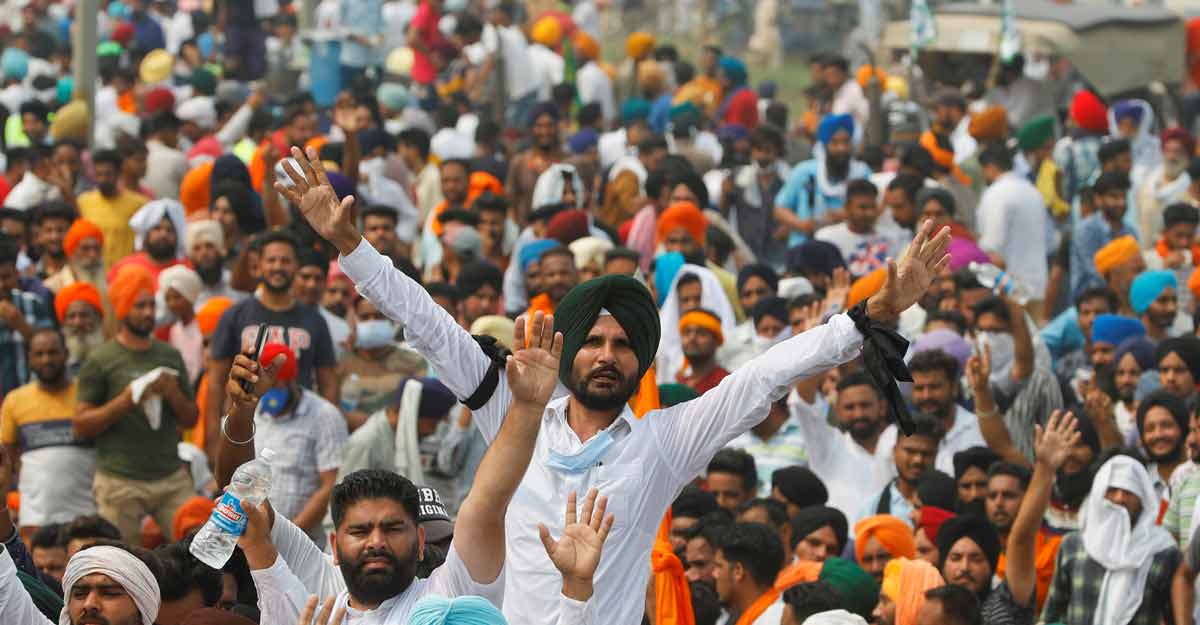
250 million unionised workers in India went on strike last week to protest a package of sweeping neoliberal reforms brought in by conservative prime minister Narendra Modi. Spearheaded by farmers and workers, flanked by students, feminists and other civil society groups, the world’s largest democracy was shut down for two days as protestors blocked access to India’s urban centres. Further action is planned. What sparked this wave of action and what does this tell us about the state of Indian society?
Last week we witnessed the largest organised strike in human history, 3.3% of the world’s population answered the call of the multiple worker’s and farmer’s movements to refute a set of reforms rammed through by PM Modi that seek to enshrine core values of unrestricted free-market competition into India’s agricultural sector. The laws enacted by parliament aim to cut out the so-called “middle-men”, the people responsible for moving products from the farmer to the wholesaler, and on to international markets. The reforms seek to allow Indian farmers to set their own prices for their products and sell directly to potential bulk buyers including Walmart. The problem with such reforms lies in the erosion of set prices that have protected India’s most economically vulnerable farmers from the fluctuation of market prices, a particularly poignant point considering the COVID-19-shaped tornado that is ravaging global markets. Farmers also claim that the main beneficiaries will be the monolithic corporations on the receiving end of their products, their financial firepower ensuring their control over the relationship between farmer and markets.
These neoliberal reforms are to be expected from India’s ruling Bharatiya Janata Party (BJP). Elected in 2014 with a convincing mandate, Modi’s Hindu nationalist ideology has spent the past six years aligning India with a largely liberal economic policy that prioritises economic growth, adherence to patterns of globalisation and a uniform civil code.
The grievances in Indian society run far deeper than these agricultural reforms. India’s economic growth has been exponential for decades now, but this emerging economy with a booming population has fallen prey to oligarchs and gargantuan corporations that hoard the benefits of India’s ascension from poverty. Inequality in India is stark and is rapidly rising, akin to a trend replicated across the world, the pandemic has seen these inequalities increase. The fortunes of India’s two richest men, Gautam Adani and Mukesh Ambani’s have increased by 200% and 25% respectively since the beginning of the pandemic, whilst the economy of India has contracted by 10%. The argument for their diligence and smart thinking is laughable, their monetary explosion can be put down to opportunism and exploitation, with lucrative government contracts being placed in the hands of these oligarchs. Nepotism is eroding the social fabric of India, but the Indian people are responding.
These recent reforms take on a much different hue to the past actions of the BJP, they reek of opportunism, “Never let a good crisis go to waste” has been the mantra for the avaricious liberal down the years, and these reforms are no different. Modi’s perception of a weakened and disorganised worker’s movement, stifled by the pandemic, which is proliferating disastrously throughout India, has proved misguided. Undeterred by the pandemic, Indian workers and farmers have refused to allow these reforms to go unchallenged. The sheer scale of the strikes has forced the Indian government into talks with unions and civil society groups.
The images of farmers throwing barricades off of bridges and of elderly protestors being struck with water cannons during the North Indian winter are powerful images of resistance to neoliberal policies that erode the solidarity and cohesion of communities. The lure of competition and the supposed “liberation” from the confines of set prices may seem appealing, yet for agricultural workers in developing states, this liberation can spell ruin for the majority that get left behind by the ruling economic class that exploit them. The economic policies that “worked” for the West are being exported to the emerging markets to lubricate the wheels of the globalised, resource-guzzling economy. Neo-colonialism is rearing its ugly head, and such a practice cannot be expected to be in the best interests of those in India who place community at the forefront of its social conscience, of which liberalism erodes, as we have seen in our own societies in the West.



Average Rating